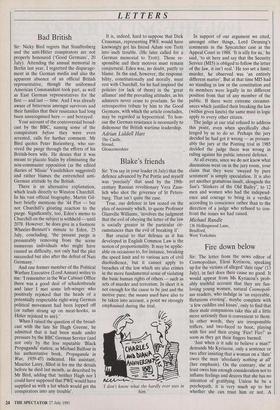Blake's friends
Sir: You say in your leader (6 July) that the defence advanced by Pat Pottle and myself was 'precisely' that used by the 19th- century Russian revoltionary Vera Zasu- lich who shot the governor of St Peters- burg. That isn't quite the case.
True, our defence in law rested on the plea of necessity which, to quote Professor Glanville Williams, 'involves the judgment that the evil of obeying the letter of the law is socially greater in the particular cir- cumstances than the evil of breaking it'. But crucial to that defence as it has developed in English Common Law is the notion of proportionality. It may be applic- able on occasions to, for instance, breaking the speed limit and to various acts of civil disobedience, but it cannot apply to breaches of the law which are also crimes in the more fundamental sense of violating the basic human rights of others — such as acts of murder and terrorism. In short it is not enough for the cause to be just and the motive pure; the means used have also to be taken into account, a point we strongly emphasised during the trial.
don't know what she hardly ever sees in him.'
In support of our argument we cited, amongst other things, Lord Denning's comments in the Spycatcher case at the Appeal Court in 1988. `It is silly for us,' he said, `to sit here and say that the Security Service (MI5) is obliged to follow the letter of the law, it isn't real.' He too set a limit; murder, he observed was `an entirely different matter'. But at that time MI5 had no standing in law or the constitution and its members were legally in no different position from that of any member of the public. If there were extreme circumst- ances which justified their breaking the law (within given limits) the same must in logic apply to every other citizen.
The judge at our trial refused to address this point, even when specifically chal- lenged by us to do so. Perhaps the jury decided he had got it wrong — as presum- ably the jury at the Ponting trial in 1985 decided the judge there was wrong in ruling against his public interest defence.
At all events, since we do not know what discussions went on in the jury room, your claim that they were `swayed by pure sentiment' is simply speculation. It is also yet another gratuitous insult, alongside the Sun's 'Stinkers of the Old Bailey', to 12 men and women who had the independ- ence and courage to bring in a verdict according to conscience rather than to the direction of a judge who refused to con- front the issues we had raised.
Michael Randle
136 Hollingwood Lane, Bradford, West Yorkshire


















































 Previous page
Previous page